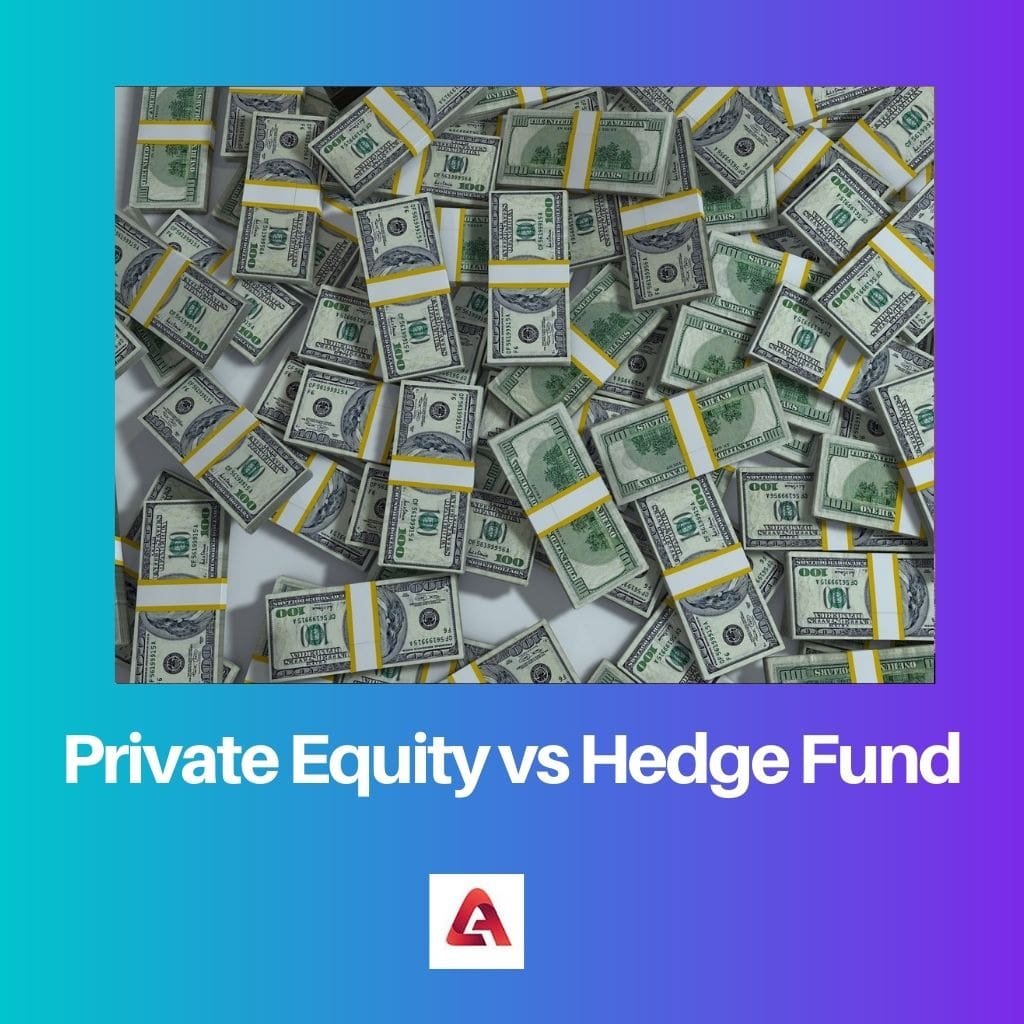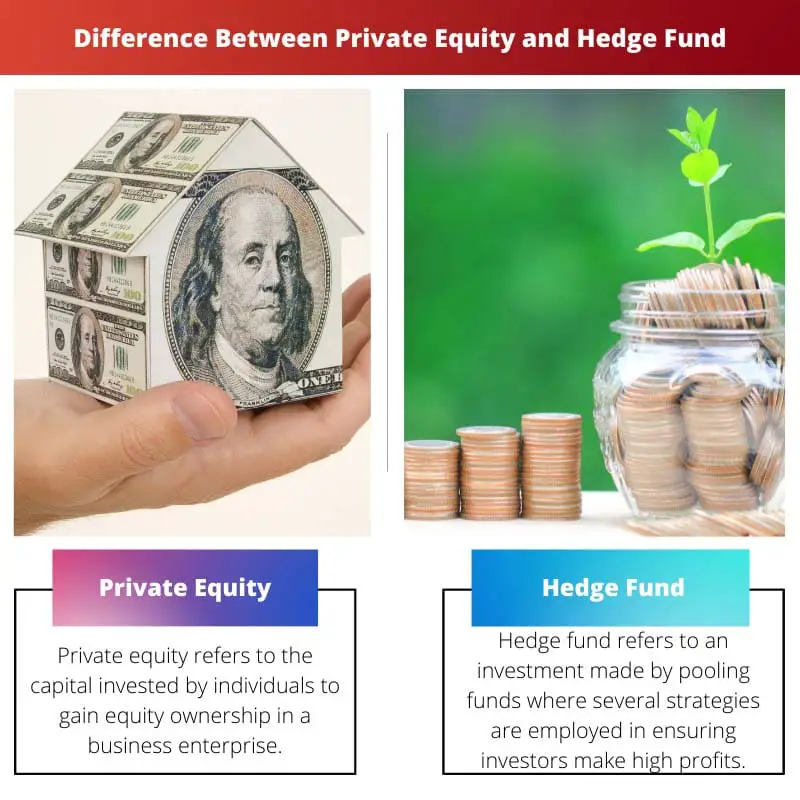Private equity firms invest in private companies, acquiring a controlling stake to drive operational improvements and increase value over the long term, through buyouts or venture capital investments. Hedge funds, on the other hand, employ various strategies across public markets, aiming for high returns by leveraging complex trading techniques, including long and short positions, derivatives, and leverage, with shorter investment horizons and a focus on managing risk and generating alpha in diverse market conditions.
Key Takeaways
- Private equity firms invest in and acquire private companies, focusing on long-term value creation, while hedge funds use diverse investment strategies to generate high returns for their investors.
- Private equity investments involve active management and operational improvement of portfolio companies, whereas hedge funds focus on financial returns through trading and investing.
- Private equity funds have longer investment horizons, while hedge funds can have shorter-term, more liquid investments.
Private Equity vs Hedge Fund
Private equity is the capital people invest to claim full ownership of a business enterprise or organization, which takes seven to ten years and has low risk involved. Hedge fund is an investment done by pooling funds while different strategies are used to ensure high profit.

Comparison Table
| Feature | Private Equity | Hedge Fund |
|---|---|---|
| Investment Type | Companies (private or controlling interest in public companies) | Financial Assets (stocks, bonds, currencies, commodities, derivatives) |
| Investment Time Horizon | Long-term (3-5+ years) | Short-term to medium-term (days to months or up to a year) |
| Investment Goal | Improve portfolio companies for long-term growth and eventual profitable exit (IPO or sale) | Generate returns through market movements and various investment strategies |
| Liquidity | Low (investments are illiquid and difficult to sell quickly) | High (investments are liquid and can be bought and sold quickly) |
| Control | Private equity firms take an active role in managing portfolio companies | Hedge funds have no control over the underlying assets they invest in |
| Fees | Typically a 2% management fee and a 20% performance fee | Lower management fees (around 1.5%) and a performance fee (around 15%) based on high-water mark |
| Investor Base | High net worth individuals, institutions (pension funds, endowments) | High net worth individuals, institutions (pension funds, endowments) |
| Risk | Generally considered less risky than hedge funds due to diversification and long-term focus | Can be high risk due to use of leverage and complex investment strategies |
What is Private Equity?
Private equity (PE) represents a distinct asset class within the broader financial landscape, characterized by investments made in privately held companies. These investments are made by private equity firms, which raise capital from institutional investors, high-net-worth individuals, and other sources to deploy in various opportunities.
Investment Approach
Buyouts and Control Investments: One of the primary strategies employed by private equity firms is the acquisition of controlling stakes in target companies, commonly referred to as leveraged buyouts (LBOs). In an LBO, the private equity firm uses a combination of equity capital and debt financing to acquire a significant ownership position in the target company. Post-acquisition, the firm works closely with the management team to implement operational improvements, strategic initiatives, and efficiency measures aimed at enhancing the company’s performance and driving growth.
Growth Capital and Venture Capital: In addition to buyouts, private equity firms also invest in companies seeking capital to fuel expansion, whether it’s scaling existing operations, entering new markets, or investing in research and development. Growth capital investments involve taking minority stakes in established companies with proven business models and strong growth prospects. Venture capital, a subset of growth capital, focuses on early-stage companies with disruptive technologies or innovative business models, providing financing and strategic guidance to help them navigate the challenges of scaling and ultimately achieve successful exits.
Value Creation
Operational Improvements: A hallmark of private equity investing is the hands-on approach taken by firms to drive value creation in their portfolio companies. This involves implementing operational improvements across various facets of the business, such as streamlining processes, optimizing cost structures, enhancing sales and marketing efforts, and strengthening corporate governance. By identifying and executing upon value-enhancing initiatives, private equity firms aim to maximize the profitability and long-term sustainability of their investments.
Strategic Initiatives and Exit Strategies: Private equity firms are also deeply involved in formulating and executing strategic initiatives aimed at positioning their portfolio companies for successful exits. This may involve pursuing add-on acquisitions to consolidate market share, expanding into new geographic regions or product lines, or orchestrating liquidity events such as initial public offerings (IPOs) or strategic sales to strategic buyers or other private equity firms. By carefully planning and executing exit strategies, private equity firms aim to realize attractive returns for their investors while simultaneously unlocking value for the portfolio company stakeholders.

What is Hedge Fund?
A hedge fund is a pooled investment vehicle that employs various strategies to generate returns for its investors. Unlike traditional investment funds, hedge funds have a flexible mandate, allowing them to invest across a wide range of asset classes and employ both long and short positions, derivatives, leverage, and other sophisticated techniques to potentially profit from market opportunities.
Investment Strategies
Long/Short Equity: One of the most common strategies employed by hedge funds is long/short equity, where managers take both long (buy) and short (sell) positions in individual stocks or sectors. By going long on undervalued securities while simultaneously shorting overvalued ones, hedge funds aim to capture alpha, or excess returns, regardless of market direction. This strategy seeks to minimize market risk while capitalizing on the manager’s skill in identifying mispriced securities.
Global Macro: Global macro funds take a top-down approach to investing, analyzing macroeconomic trends, geopolitical events, and other factors to make directional bets on currencies, interest rates, commodities, and other asset classes. Managers may take long or short positions in various instruments based on their macroeconomic outlook, aiming to profit from shifts in global economic conditions or market sentiment.
Risk Management
Hedging Strategies: Hedge funds employ a variety of hedging techniques to manage risk and protect capital. This may include using derivatives such as options and futures to hedge against adverse movements in the market, as well as employing dynamic portfolio management techniques to adjust exposures in response to changing market conditions. By actively managing risk, hedge funds seek to mitigate potential losses and preserve capital in volatile market environments.
Diversification and Alternative Assets: Many hedge funds pursue diversification across asset classes and investment strategies to reduce portfolio risk and enhance returns. In addition to traditional equities and fixed income securities, hedge funds may invest in alternative assets such as real estate, private equity, distressed debt, and structured products. By diversifying across uncorrelated sources of return, hedge funds aim to improve the risk-adjusted performance of their portfolios and minimize the impact of adverse market events.
Performance and Fees
Performance Incentives: Hedge fund managers earn performance fees based on the fund’s returns, providing them with a direct financial incentive to generate positive performance for investors. Performance fees are calculated as a percentage of profits earned by the fund, subject to a high-water mark or hurdle rate, which ensures that managers are only compensated for outperformance relative to previous peaks in the fund’s value.
Fee Structure: In addition to performance fees, hedge funds charge a management fee, which is calculated as a percentage of assets under management (AUM) and covers the fund’s operating expenses and overhead costs. The combination of management and performance fees can result in a fee structure that is higher than that of traditional investment funds, reflecting the active management and potentially higher returns associated with hedge fund investing.

Main Differences Between Private Equity and Hedge Funds
- Investment Focus:
- Private equity primarily invests in privately held companies, acquiring controlling stakes to drive operational improvements and long-term value creation.
- Hedge funds invest across various asset classes and employ diverse strategies, including long/short equity, global macro, and event-driven, aiming for alpha generation and risk management.
- Investment Horizon:
- Private equity investments have a longer time horizon, with firms focused on enhancing the performance of portfolio companies over several years before exiting.
- Hedge funds have shorter investment horizons, with strategies ranging from short-term trading to longer-term positions, depending on market conditions and fund objectives.
- Risk and Return Profiles:
- Private equity investments involve higher levels of illiquidity and operational risk due to the direct ownership and active management of portfolio companies.
- Hedge funds may employ leverage and derivatives to enhance returns but also entail higher levels of market and liquidity risk, given their active trading and exposure to various asset classes.
- Ownership and Control:
- Private equity firms acquire majority stakes in target companies, allowing for significant control over strategic decisions and operational initiatives.
- Hedge funds take minority positions in publicly traded companies or invest in liquid securities, exerting less direct control over the companies in which they invest.
- Fee Structure:
- Private equity firms charge management fees, lower than those of hedge funds, along with performance fees based on the realized gains from portfolio company exits.
- Hedge funds commonly charge both management fees, calculated as a percentage of assets under management, and performance fees, calculated as a share of profits generated by the fund.

Last Updated : 04 March, 2024

Chara Yadav holds MBA in Finance. Her goal is to simplify finance-related topics. She has worked in finance for about 25 years. She has held multiple finance and banking classes for business schools and communities. Read more at her bio page.

The comparison table is very helpful in understanding the nuances between private equity and hedge funds. Great job!
The detailed explanation of private equity’s long-term investment horizon and value creation strategies is a great resource for anyone interested in this field.
The comparison of control and influence in private equity and hedge funds is a thought-provoking discussion. It adds depth to the understanding of these investment strategies.
The article provides a clear breakdown of the risk and return profiles of private equity and hedge funds, helping investors make informed decisions.
The article presents a well-structured comparison of private equity and hedge funds, shedding light on their investment structures and ownership.
This article provides a comprehensive and detailed breakdown of the differences between private equity and hedge funds. It is insightful and informative.
This article brings clarity to the concept of private equity and its key characteristics, making it an excellent read for those looking to expand their knowledge in finance.
I appreciate the thorough explanation of private equity and its key characteristics. It’s an eye-opener for those unfamiliar with the concept.
The insight into the investment focus of private equity and hedge funds is enlightening. It provides a clear understanding of the differences in their approaches.
The section on exit strategies and fees in private equity is very insightful. It’s valuable information for anyone considering investments in this area.